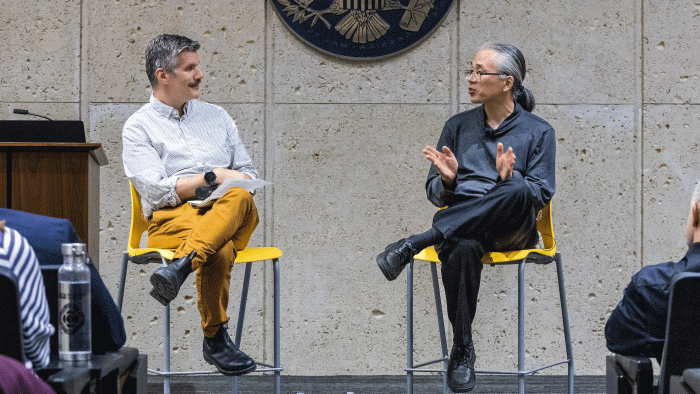Leading science fiction writer Ted Chiang explores technology's impact on writing

Science fiction author and futurist Ted Chiang smiles during Thursday evening's Humanities Institute Distinguished Lecture at Armstrong Hall on ASU's Tempe campus. Chiang explores complex relationships between science, technology, religion and philosophy in unconventional and insightful ways through his writing. He posed the question about the advancement of communication, starting with the spoken word, progressing to the written word, and evolving into what is next. Photo by Charlie Leight/ASU News
Science fiction author Ted Chiang spends a lot of time thinking about language and writing. It’s his livelihood — his work has earned four Hugo and four Nebula awards, among other accolades — but one might argue that language is also a special focus.
His novella “Story of Your Life” — adapted into the 2016 movie “Arrival,” starring Amy Adams and Jeremy Renner — has at the core of its worldbuilding an alien language that, well, no spoilers, but there’s more to this language and how it affects its users than first appears.
So it wasn’t a surprise that language was the focus of Chiang’s remarks Thursday evening at Arizona State University as the 2024 Humanities Institute distinguished lecturer.
He spoke at Armstrong Hall on the Tempe campus about the evolution of speech to writing, calling written language a form of technological breakthrough. First there was speech — a natural biological function — but writing had to be invented and purposefully taught. No one spontaneously learns to read on their own, Chiang said. Writing changed how we use language.
“The bards of ancient Greece used patterns like (rhyme and meter) to improvise their way through thousands of lines of verse,” he said. “... Nowadays, we think of rhythm and meter as primarily decorative features. They’re an important part of pop music, so much so that we have come to associate them with a lack of seriousness, which may be why their role in modern poetry has declined.
“But before writing was widely used, rhyme and meter were essential mnemonic tools. There was no way anyone could have remembered the Iliad and the Odyssey if they consisted of ordinary prose. But now, because we used the written word instead of our memories, rhyme and meter exist mostly for fun.”
He doesn’t think language is done evolving.
“What is the next step beyond writing itself?” he asked, wondering how technology will influence written language in the future.
“What is the cognitive technology that will succeed writing? Suppose it’s 100 years from now or maybe 1,000 years from now, and you are going to give a presentation. What kind of technology are you going to use to help you figure out what you’re going to say?
“I don’t mean a replacement for word processing software. Is there some sort of cognitive technology similar to writing, but better than writing that will help you articulate your thoughts and choose the words you will actually say when you give your presentation? A successor to writing that can only exist in a digital medium?”
A conversation with Matt Bell, director of ASU’s Worldbuilding Initiative and a professor in the Department of English, followed the lecture. Chiang told Bell that he was skeptical about the role of artificial intelligence in creative writing.
“The question of conscious machines is one that I think is super interesting and raises a lot of philosophical questions, like what kind of respect do we owe to conscious machines that we make?” Chiang said.
“… Right now, we’re just dealing with these autocomplete on steroids, and the fact autocomplete on steroids is kind of spookily good is really weird and interesting, and it might be very useful. … But right now, it seems like they’re pretty terrible at every use that people are proposing.
“They’re definitely interesting in terms of what they reveal about the statistical properties of text … but they do not deserve respect. Anyone who tries to claim differently is trying to sell you something.”
Chiang said he hopes technology’s future influence on the written word won’t “dehumanize” its art.
“A lot of people feel that technology is dehumanizing, and there are plenty of situations where I feel that is accurate,” he said.
“But if there is any technology that is humanizing rather than dehumanizing, it is the written word. The written word helps us to be creative, and it helps us to be, and it helps us to reason. And those are the most human of activities.”
About the program
The Humanities Institute’s Distinguished Lecture program brings to ASU a prominent scholar whose work highlights the importance of humanities research. While on campus, speakers discuss humanities trends and participate in informal sessions, allowing ASU colleagues and students to share related research interests. In Chiang's case, his visit included a screening of "Arrival" and film discussion on Friday, co-sponsored by ASU’s Center for Science and the Imagination.
More Arts, humanities and education

Pen Project helps unlock writing talent for incarcerated writers
It’s a typical Monday afternoon and Lance Graham is on his way to the Arizona State Prison in Goodyear.It’s a familiar scene. Graham has been in prison before.“I feel comfortable in prison because of…

Phoenix civil rights activists highlighted in ASU professor’s latest book
As Phoenix began to grow following WWII, residents from other parts of the country moving to the area often brought with them Jim Crow practices. Racism in the Valley abounded, and one family at…

Happy mistake: Computer error brings ASU Online, on-campus students together to break new ground in research
Every Thursday, a large group of students gathers in the Teotihuacan Research Laboratory (TeoLab) in the basement of the School of Human Evolution and Social Change building on Arizona…


